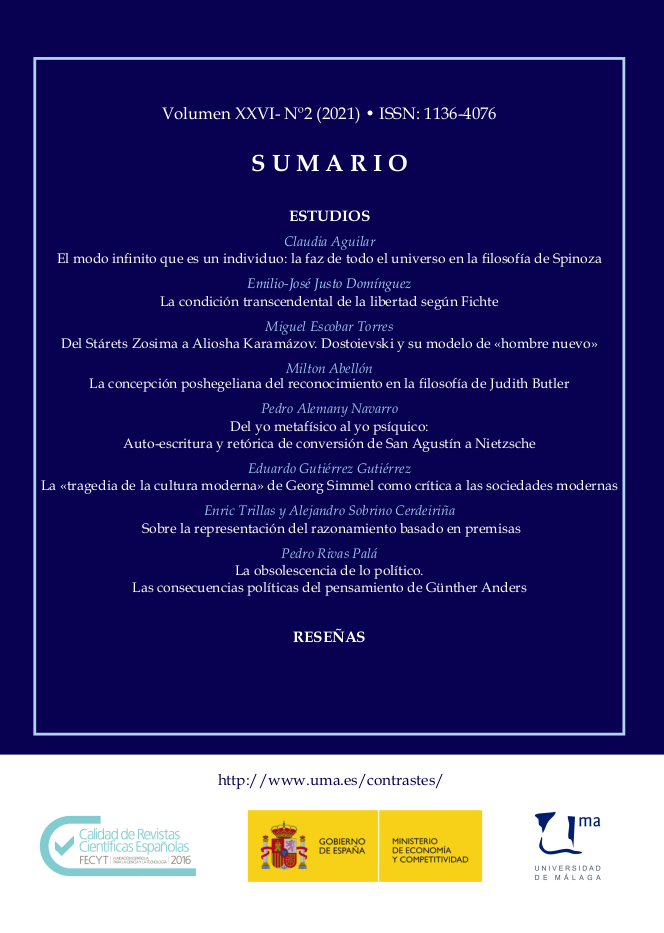The obsolescence of politics
The political consequences of Günther Anders’ philosophy
DOI:
https://doi.org/10.24310/Contrastescontrastes.v26i2.10195Keywords:
Günther Anders. Political Philosophy. TechnologyAbstract
The purpose of this work is, in the first place, to expose the central lines of Günther Anders' thought that are, in my opinion, necessary to obtain, in a second moment, relevant consequences for the present understanding of the political. In particular, the human being has ceased to be the subject of politics and in the current sovereignty of technology it seems that he has no possibility of taking up that role again.
Downloads
Metrics
Publication Facts
Reviewer profiles N/A
Author statements
Indexed in
-
—
- Academic society
- N/A
- Publisher
- Universidad de Málaga
References
Anders, G., La obsolescencia del hombre (Volumen I). Sobre el alma en la época de la segunda revolución industrial (1956), traducción de Josep Monter Pérez. Valencia: Pre-textos, 2011.
Anders, G. La obsolescencia del hombre (Volumen II). Sobre la destrucción de la vida en la época de la tercera revolución industrial (1980), traducción de Josep Monter Pérez. Valencia: Pre-textos, 2011.
Anders, G., “Theses for the atomic age”, The Massachusetts Review, 3 (1962), pp. 493-505.
Argiroffi, A., “Il Diritto nell´esistenza di Sergio Cotta e la tardomodernitá secondo Günther Anders”, Persona y Derecho, 57 (2007-2), pp. 245-268.
Armon, A., “The Parochialism of Intellectual History: The Case of Günther Anders”, Leo Baeck Institute Year Book, 62 (2017), pp. 225-241.
Barcellona, P., Posmodernidad y comunidad. El regreso de la vinculación social. Madrid: Trotta, 1999.
Díaz Isenrath, C., “Técnica y singularidad en Günther Anders y Gilbert Simondon”, Revista CTS, 14 (5) (2010), pp. 105-116.
Ferrer García, A., “En la era atómica, ¿un lugar para la moral?”, Revista de Filosofía (Universidad del Zulía), 83 (2) (2016), pp. 91-104.
Hernández Pérez, A. & Herrera, R., “Apuntes sobre el nihilismo: de la Ilustración a la bomba atómica. Un estudio comparativo entre J. G. Hamann y Günther Anders”, Contrastes, 25 (1) (2020), 61-76.
Liessmann, K. P., “Thought after Auschwitz and Hiroshima: Günter Anders and Hannah Arendt”, Enrahonar, 46 (2011), pp. 123-135.
Macedo Osorio, G., “Hacia una reflexión sobre la crisis ambiental. Max Horkheimer y Günther Anders: Afán de dominio y desfase prometeico”, Bajo Palabra, 21 (2019), pp. 81-94.
Maomed Parraguez, M. C., “Razón práctica, imaginación y sensibilidad motral en Günther Anders” en M. Silar & F.
Schwember Augier, Racionalidad práctica. Intencionalidad, normatividad y reflexividad. Comunicaciones a las XLV Reuniones Filosóficas. Pamplona: Cuadernos de Anuario Filosófico 202, 2009, pp. 81-89.
Miano, F., “Günther Anders e la vergogna prometeica”, Etica & Politica, XV (2) (2013), pp. 246-257.
Müller, Ch., “Desert Ethics: Technology and the Question of Evil in Günther Anders and Jacques Derrida”, Parallax, 21 (1) (2015), pp. 42-57.
Nosthoff, A-V. & Maschewski, F., “The obsolescence of politics: rereading Günther Anders´s critique of cybernetic governance and integral power in the digital age”, Thesis Eleven, 153 (1) (2019), pp. 75-93.
Polo Blanco, J., “Antropología de la obsolescencia humana. Hiperconsumo, tecnofilia y velocidad mercantil”, Revista de Filosofía (Ediciones Complutense), 43 (2) (2018), pp. 295-314.
Portinaro, P. P., Il principio disperazione. Tre studi su Günther Anders. Torino: Bollati Boringhieri, 2003.
Rasini, V., “Il potere della violenza. Su alcune rifflessioni di Günther Anders”, Etica & Politica, XV (2) (2013), pp. 258-270.
Rodríguez Alonso, G., “Günther Anders, técnica y apocalipsis”, Forma. Revista d´estudis comparatius, 16 (2017), pp. 81-95.
Schaube, E., “Torturing Things Until They Confess: Günther Anders´ Critique of Technology”, Science as Culture, 14 (1) (2005), pp. 77-85.
Virilio, P., Velocidad y Política. Buenos Aires: La Marca, 2006.
Downloads
Published
How to Cite
Issue
Section
License
This journal provides immediate free access to its content under the principle of making research freely available to the public. All content published in Contrastes. Revista Internacional de Filosofía, are subject to the Creative Commons Attribution-NonCommercial-ShareAlike 4.0 license whose full text can be found at <http://creativecommons.org/licenses/by-nc-sa/4.0>
It is the responsibility of the authors to obtain the necessary permissions of the images that are subject to copyright.
Authors whose contributions are accepted for publication in this journal will retain the non-exclusive right to use their contributions for academic, research and educational purposes, including self-archiving or repository in open access repositories of any kind.
The electronic edition of this magazine is edited by the Editorial Service of the University of Malaga (Uma Editorial), being necessary to cite the origin in any partial or total reproduction.










5.png)
